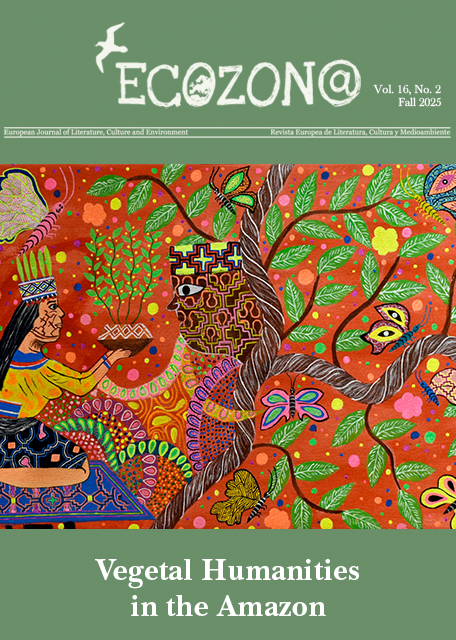Narrating in Multinatural Word and Color
Vegetal Vitality in Lastenia Canayo’s "Los dueños del mundo Shipibo"
DOI:
https://doi.org/10.37536/ECOZONA.2025.16.2.5733Schlagworte:
Ancestrality, Indigenous art, Indigenous literature, Shipibo, territorialityAbstract
Shipibo artist and writer Lastenia Canayo’s 2004 visual/textual work Los dueños del mundo Shipibo presents images and descriptions of more-than-human beings of the Shipibo cosmovision. The titular Shipibo dueños are often associated with a specific type of plant, relating ancestral belief to natural resources in Shipibo territories in Western Amazonia. Throughout her work, Canayo, whose Indigenous name Pecon Quena means “la que llama a los colores” (“she who calls the colors”), emphasizes how Shipibo commitments to their natural environment are a function of their ancestral beliefs, in turn offering a counternarrative of vegetal vitality to extractivist deforestation and destruction on Shipibo Amazonian lands. Canayo’s images—paired with texts written in the Spanish language—invite reader/viewers, Indigenous or not, to come to know and learn from Shipibo knowledge in word and in color. Ancestrality and territoriality, concepts broached by Graça Graúna (2013) and Robert David Sack (1986), respectively, textually and visually unite in Canayo’s work to underscore how cosmogonic knowledge embodied in the dueños sustains Shipibo communities, as much in daily life today in the twenty-first century as well as in imagining Amazonian futures. In presenting a multi-edged vegetal vitality as a force of sustenance in Shipibo communities, Canayo deploys ancestrality and territoriality to textually and visually demarcate Shipibo socioenvironmental relations in Amazonia. As she mediates coloniality through her textual/visual narratives, Canayo highlights the diverse plant life along the Ucayali river and its tributaries, cosmological beings that multinaturally bridge human and more-than human Shipibo worlds, to engage with Eduardo Viveiros de Castro’s (2002/2020) understanding of multinaturalism, and to promote an imaginary of Amazonia that centralizes human and more-than-human socioenvironmental interactions
Downloads
Downloads
Veröffentlicht
Ausgabe
Rubrik
Lizenz
Authors who publish with this journal agree to the following terms:
a) Authors retain copyright and grant the journal right of first publication with the work simultaneously licensed under a Creative Commons Attribution License that allows others to share the work with an acknowledgement of the work's authorship and initial publication in this journal (CC BY-NC for articles and CC BY-NC-ND for creative work, unless author requests otherwise.
b) Authors are able to enter into separate, additional contractual arrangements for the non-exclusive distribution of the journal's published version of the work (e.g., post it to an institutional repository or publish it in a book), with an acknowledgement of its initial publication in this journal.
c) Authors are permitted and encouraged to post their work online (e.g., in institutional repositories or on their website) prior to and during the submission process, as it can lead to productive exchanges, as well as earlier and greater citation of published work (See The Effect of Open Access).










